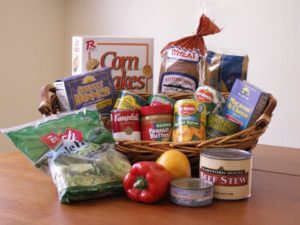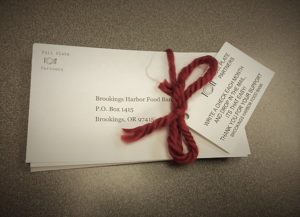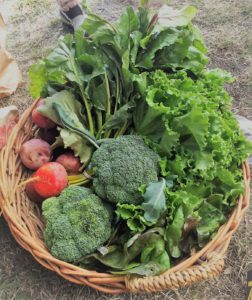Food Bank Responds Creatively to Community Need
Nonprofit Profile: Brookings-Harbor Food Bank
“Give people an opportunity to give, and they will.”
–Pamela Winebarger, Executive Director of the Brookings-Harbor Food Bank
During the Chetco Bar Fire in August of 2017, there was a 400% increase in people coming to the Brookings-Harbor Food Bank. In August alone, the numbers went from a normal 1800 people helped, to over 4300; the need tripled. The Brookings-Harbor Food Bank stopped requiring income verification- anyone who needed food during the crisis got some- and they started handing out weekly boxes instead of the normal monthly one.
Since that time, the food bank has still seen some increase in their numbers. Their daily counter food, where individuals can come to the food bank daily and receive protein rich items, such as a boiled egg, chicken and several other items, sees 800-900 individuals monthly for the daily program. Approximately 400 food boxes go out monthly, feeding around 1200 people. Weekly snack packs go out to many children ages 2-17. 2017 was their biggest year thus far with over 3,900 children receiving snack packs.
With this ongoing and increased need for food in the community, the Brookings-Harbor Food Bank has had to respond creatively. I recently interviewed Pamela Winebarger, the Executive Director of the Brookings-Harbor Food Bank to get the story.
How It All Got Started:
Brookings-Harbor Food Bank was established in 1984 by local citizens who saw a need for food assistance in Brookings. In 2017, they served 29,684 individuals in the Brookings-Harbor area through their daily counter, food box and snack pack programs. Pamela Winebarger has been their Executive Director since April 2017. She has over 6 years’ experience managing a food bank in California and Nevada. Before that, she spent over 30 years in social service type work, helping people from all stages of life.
Meeting the Community Need:
When asked what she attributes the food bank’s successes towards, Pamela responds that networking and being proactive have been crucial to their success. “Nonprofits have to reach out to others, see what they are doing. Go out and get information.” Pamela does this in a variety of ways: she attends the St. Tim’s soup kitchen once a month on Saturdays, as her schedule allows, and she regularly attends Wild Rivers Connect luncheons to network with other nonprofit leaders in the community. She also works to get the word out about what is going on at the food bank.
Pamela attributes support from organizations and individuals in the community to their success as well. “Those people keep us in a place where we can help other people.” Their list of community partners is long: The Oregon Food Bank, South Coast Food Share, Wild Rivers Community Foundation, Chetco Grange, Emblem Club, Church of the Nazarene, Rotary Club, High School garden program, Girl Scouts, Grocery Outlet, Dollar Tree, Bi Mart, Fred Meyer, The Salvation Army, Oregon Coast Community Action, multiple churches, civic organizations, and the list goes on!
Volunteers are also crucial for the day-to-day operations of the Brookings-Harbor Food Bank and really step up in times of crisis. Pamela reflects on the Chetco Bar Fire: “Thank goodness for our Food bank manager, Carolita Briggs, and the 18-20 other volunteers who pushed themselves all of August and September, during the worst of it,” Pamela recalls, “they were a Godsend, and I had to be constantly making sure they would take a break and not push themselves so hard!”
In addition to accepting donations, Pamela applies for grants to support their programs. She recently received a grant to increase protein items, like yogurt, cheese, and tuna, in the snack packs that go to children. She is seeking a grant to increase the protein of their counter options for people coming in daily, which was over 10,000 people last year. Protein and carbohydrates are crucial to sustain people who are hungry.
Projects in the Works:
The Brookings-Harbor Food Bank is always on the lookout for creative solutions to the increased need in the community. Sometimes that means learning from programs that already exist instead of reinventing the wheel. They are working on two new projects, Full Plate Partners and the Neighborhood Food Project to engage donors. “A lot of people want to donate, but they don’t know how,” says Pamela. “This makes it easy.”
Full Plate Partners is a donation program that began in Eureka, California. People in the community that choose to participate are sent 12 pre-addressed envelopes; this makes it easy for them to send a monthly donation to the Food Bank. Brookings-Harbor Food Bank is rolling out the Full Plate Partners locally, and Pamela is working with Del Norte Office Supply for supplies. Pamela thinks this a great method for many nonprofits, not only food banks, to engage their donors. People are responding well, “I have had such an outpouring of positive feedback,” says Pamela. Whenever she shows people the envelopes, they want to sign up for the program.
The Brookings-Harbor Food Bank also has plans to support a Neighborhood Food Project in the Brookings area. This program started in Medford in 2008 and has been successfully introduced in many other communities across the U.S., both rural and urban. This is how it works: a volunteer called a neighborhood coordinator recruits neighbors to participate in the program. The neighbors each receive a green reusable bag, and when they visit the grocery store, they purchase an extra non-perishable food item and store it at home in the bag. Every two months, the bags are collected and participants receive a new empty bag. It is a way of enlisting long term donors and making it simple to donate. Currently the Brookings-Harbor Food Bank is looking for a volunteer to head up coordination for this project.
This video shows a Neighborhood Food Project in action:
How to Donate:
Money and food donations are always appreciated at the Brookings-Harbor Food Bank. With monetary donations, the food bank is able to purchase food at a lower price. However, if you do want to donate food, they are always in need of protein packed items such as peanut butter and tuna. Visit their wish list here. A note for all the gardeners out there: Brookings-Harbor Food Banks is able to accept donations of fresh produce from home gardens!
To contact the Brookings-Harbor Food Bank visit their website here or come network with Pamela at the next Wild Rivers Connect luncheon. Sign up here to join the Wild Rivers Connect email list.
About Wild Rivers Connect:
Wild Rivers Connect provides networking opportunities and resources for nonprofits in Curry and Del Norte Counties. The Brookings-Harbor Food Bank has a listing on the Wild Rivers Connect (WRC) website. If you have questions about how WRC can help your nonprofit organization, please contact us.
Article based on an interview conducted with Pamela Winebarger on February 5, 2018.





